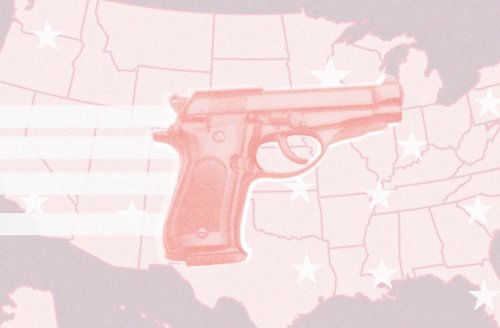America’s Gun Violence Is a Public Health Crisis, Not Just an ‘Unspeakable’ Tragedy
Gun violence is a health emergency, not an unspeakable tragedy. More than 100 Americans are killed with guns each day. Let's do something about it.

Editor’s Note: This article was originally published on August 5, 2019. However, its message—that gun violence is a public health crisis in America and must be addressed with swift gun control legislation—remains relevant. We are resurfacing it now in the wake of the shootings in Lewiston, Maine, on October 25, 2023.
Experts in This Article
licensed clinical psychologist, trauma expert, and founder and executive director of Cira Center for Behavioral Health and Cira Center Consulting
The back-to-back massacres in El Paso, Texas, and Dayton, Ohio, in August 2019—which together left 29 people dead and another 53 injured—marked the 251st and 252nd mass shootings of the year in the United States. Since then, three more mass shootings that didn’t make the national news have occurred, according to the Gun Violence Archive (a nonprofit that tracks America’s gun violence statistics). Some perspective: Today is the 217th day of the year. A quick math equation reveals the awful truth: The United States is moving at the breakneck (and, frankly, devastating) pace to average more than one mass shooting per day.
There’s an adjective invoked often when discussing gun violence. It’s described as “unspeakable”—”unspeakable tragedy,” “unspeakable act of violence,” “unspeakable massacre,” “unspeakable evil“—and then, like a collective self-fulfilling prophecy, it becomes just that: a widespread crisis that feels so uncontrollable that grasping for the right words to solve it feels like gasping for air.
The Sandy Hook Elementary school shooting claimed 28 lives in 2012, and since then, I’ve been bitingly aware of the armor I’ve built up against the reality that more that 100 Americans are killed with guns every 24 hours. The thing is though, this armor doesn’t deflect, but instead temporarily numbs me to the figures that enumerate the lives cut short, the families with one less person at the dinner table, and the internal outcry of “What if?” that now accompanies stepping into public gathering places like malls, movie theaters, and concert venues. What we have on our hands is nothing short of a public health crisis that demands to be verbalized. Not only right now, but for the remaining 148 days of 2019—and all the days that follow.
What we have on our hands is nothing short of a public health crisis that demands to be verbalized.
The Center for Disease Control and Prevention (CDC) defines “public health” as the concern “with protecting the health of entire populations. These populations can be as small as a local neighborhood, or as big as an entire country or region of the world.” Clearly, gun violence now presents a “threat” to the entire population of people living in America. There are nearly 330 million people currently living in the U.S., and more than half have experienced some form of gun violence, or know someone who has, according to a Kaiser Family Foundation survey. In 2016, the American Medical Association (AMA) officially declared gun violence a public health crisis.
Considering that gun violence has long been considered a crisis, why is it not treated in tandem with other public health crises (like the opioid epidemic)? For identified public health crises, The World Health Organization (WHO) outlines strategies centered around “crisis preparedness, mitigation, response, and recovery.” The latter aspect cannot be overstated. The emotional trauma in the aftermath of shootings can live on in survivors for years after the news cycle has moved onto the next mass shooting. Colleen Cira, PsyD, the founder and executive director of the Cira Center for Behavioral Health, previously told Well+Good that the first month following a traumatic event is often characterized by a condition called acute stress disorder. “The body is in a state of hyper arousal. That means the nervous system is constantly running as though there is a danger 24/7, even when [the person] is now safe, leading to a feeling of always having to look over your shoulder, irritability, and anxiety,” explained Dr. Cira. And that’s not all: The Journal of Traumatic Stress estimated that 7 to 10 percent of trauma victims suffer from post-traumatic stress disorder (PTSD), a condition that the Journal European Journal of Psychotraumatology declared a public health issue in 2017.
The message here is abundantly clear—and has been spoken, quite plainly, by the world’s leading health experts. For too long, these events have been labeled as unspeakable, when in fact, so many of us just don’t want to hear the solution: gun control. There are steps the United States could take today to restrict access to firearms and finally put a stop to gun violence. (A 1996 shooting in Australia left 35 people dead and 23 wounded, prompting legislation that caused a dramatic decline in gun crimes.) Nonprofit organizations like Everytown for Gun Safety have adhered to the WHO’s guidelines for facing large-scale loss of human life. They’ve assembled a team of litigators to help Americans navigate the criminal justice system in the wake of gun violence, and have clamored for background checks that would “mitigate” future tragedies. The Coalition to Stop Gun Violence and The Joyce Foundation are doing similar work.
All Americans have the opportunity to alter the future of how the U.S. comes to grips with the Second Amendment. Our jobs, as voters—and as human beings—is to take action.
If you or someone you has experienced trauma related to gun violence, please call the American Counseling Association at 1-800-985-5990.
Kilpatrick, Dean G et al. “National estimates of exposure to traumatic events and PTSD prevalence using DSM-IV and DSM-5 criteria.” Journal of traumatic stress vol. 26,5 (2013): 537-47. doi:10.1002/jts.21848
↩︎
Sign Up for Our Daily Newsletter
Get all the latest in wellness, trends, food, fitness, beauty, and more delivered right to your inbox.
Got it, you've been added to our email list.










